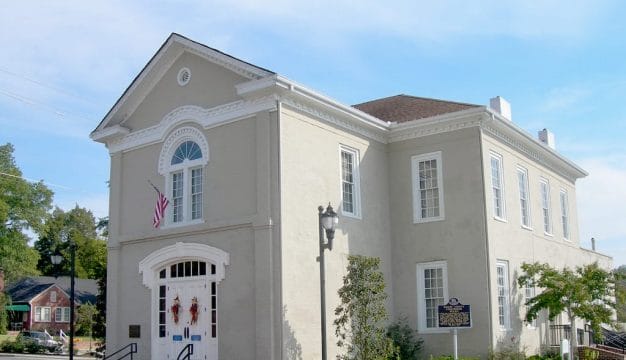Miles Clayton Allgood
 Miles Clayton Allgood
Miles Clayton Allgood (1878-1977) was a Democrat who represented the Seventh District of Alabama from 1923 to 1935 and the Fifth District from 1933 to 1935. A public school teacher by training, he later served in several agriculture-related positions and became involved in local politics to advocate for the needs of his predominantly rural district. He is most remembered for chairing the War Claims Committee, helping to bring the Tennessee Valley Authority (TVA) to Alabama, and for his support of the Davis-Bacon Act of 1931.
Miles Clayton Allgood
Miles Clayton Allgood (1878-1977) was a Democrat who represented the Seventh District of Alabama from 1923 to 1935 and the Fifth District from 1933 to 1935. A public school teacher by training, he later served in several agriculture-related positions and became involved in local politics to advocate for the needs of his predominantly rural district. He is most remembered for chairing the War Claims Committee, helping to bring the Tennessee Valley Authority (TVA) to Alabama, and for his support of the Davis-Bacon Act of 1931.
Allgood was born in Chepultepec, Blount County, on February 22, 1878, to William Barrett and Mary Ingram Allgood; he was one of nine children. Allgood's father held a number of different jobs in the community, including school trustee, justice of the peace, and physician. He is most prominently remembered, however, as the city's postmaster who changed the name of the city to Allgood in 1915 after a local lime manufacturer complained that the difficult spelling of the city's name was affecting his business negatively.
Allgood attended Blount County schools and completed his secondary education at the State Normal College (present-day University of North Alabama) in Florence, Lauderdale County. He graduated with a teaching certificate in 1898 and worked as a teacher in Chepultepec until 1901, when he was elected as tax assessor of Blount County. Miles married Willie Randall Fox on February 1, 1917, in Montgomery, Montgomery County, and they had three children.
Allgood was elected as superintendent of the livestock department for the Birmingham State Fair, and by 1911 he had become a farm demonstration agent for Blount County. He resigned from this position in 1913, when he was appointed as the state auditor; in 1919, he was appointed commissioner of the Department of Agriculture and Industries. Allgood's work in these different positions made him popular among the farming communities of northern Alabama. He was elected as a delegate to the 1920 Democratic National Convention in San Francisco, California. In 1922, Allgood won the Fifth Congressional District seat left open by the retirement of Lilius B. Rainey. That district covered the state's most northern counties, as well as part of Morgan County. Allgood was a member of the Committee for Enrolled Bills, which he quit in 1929 after African American Oscar Stanton De Priest, a Republican from Illinois, joined the committee, refusing to serve with an African American.
Allgood is most notably remembered for his support of the Davis-Bacon Act of 1931. This law aimed to make employers engaged in public works construction projects pay the local prevailing wage and prevent employers from using cheaper outsourced labor that took jobs away from local unionized workers. Historians have come to view Allgood's ardent support of the Davis-Bacon Act as likely stemming from his personal racial animus. In remarks printed in the Congressional Record, Allgood brags that his support for the bill was intended to keep cheap African American labor out of the southern construction industry. Additionally, Allgood went before Congress in support of the bill to condemn an unnamed Alabama contractor who had reportedly gone to New York to hire cheaper bootleg labor, which Allgood argued took work away from local white unionized laborers. The bill became law in 1931, and Allgood's speech is found in many sources on the topic.
From 1931 to 1935, Allgood chaired the Committee on War Claims, which oversaw claims and demands made to the United States such as war claims, land claims, and pensions, including continued reparation payments from Germany for its involvement in World War I. In local affairs, Allgood was involved in bringing the Tennessee Valley Authority to Alabama to aid in energy production and transportation. As a supporter, Allgood helped convince Pres. Franklin D. Roosevelt to visit Alabama and showed him various Alabama locations capable of housing hydroelectric power sources.
Allgood won reelection in 1933 against incumbent LaFayette Lee Patterson after he was redistricted to the Fifth District but lost his bid for reelection to Joe Starnes in 1934. From September 1935 until his retirement in 1943, he worked for the New Deal Farm Security Administration, which aimed to help tenant farmers and sharecroppers buy and improve the land they farmed. He made one last attempt to reenter politics in 1954, when he unsuccessfully ran for Alabama state treasurer, after which, he permanently retired from public life. One of the longest-lived U.S. representatives, Allgood died at age 99 on March 4, 1977, in Fort Payne, DeKalb County, and was buried in nearby Valley Head Cemetery.



